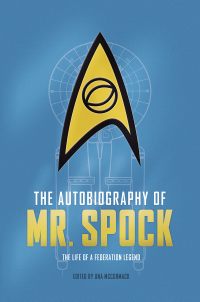
As we continue to celebrate the 55th anniversary of "Star Trek," Gene Roddenberry's visionary brainchild, Titan Books is shining the interstellar spotlight on perhaps the franchise’s greatest fictional celebrity … Spock.
Thanks to the masterful performances of Leonard Nimoy (and later Zachary Quinto and Ethan Peck), Spock is arguably the greatest character ever to emerge in modern pop culture history and his enduring popularity across generations is definitive proof. The logical Vulcan is at the very heart of "Star Trek" with his superior intellect, admirable humanity, and wry sense of humor.
While various elements of Spock's early life and career path in Starfleet have been documented in numerous feature films, comics, and multiple TV series, there's never been a full account of his fictional life put down on the page until now. Titan’s "The Autobiography of Mr. Spock" (which dropped last month) serves to satisfy that neglected corner of the "Star Trek" universe with a new detailed bio exploring some of the lesser-known specifics of the USS Enterprise's legendary science officer.
Related: Star Trek movies, ranked worst to best
The Autobiography of Mr. Spock (Titan Books) was $24.99 now $20.99 at Amazon
Save 16% on the definitive life story of one of the most beloved Star Trek characters of all time with Titan Books' The Autobiography of Spock edited by Una McCormack.
Edited by Una McCormack, this 224-page hardback salutes one of the Federation’s most honored citizens by delving deeper into Spock's troubled childhood on Vulcan with Michael Burnham, his unexpected enrollment at Starfleet Academy, adventures aboard the Enterprise with Captains Kirk and Pike, and his later shift to diplomatic and ambassadorial roles, including his secret mission to Romulus.
Fresh details of his life on Vulcan and the Enterprise are also explored, along with revealing insights into Spock’s relationships with the most influential figures in his life, including Sarek, Michael Burnham, Christopher Pike, Kirk, and Dr. McCoy, all presented in Spock's inimitable vocal style and diction.
Live long and prosper with our exclusive excerpt for Titan Books' "The Autobiography of Mr. Spock" in the preview below!
Get the Space.com Newsletter
Breaking space news, the latest updates on rocket launches, skywatching events and more!
Related: Every actor who has ever played Spock on 'Star Trek'
Excerpt from The Autobiography of Mr. Spock
It has long been my custom, before embarking upon a great voyage, to set my affairs in order. I am motivated, in part, by a desire to make this as straightforward and painless as possible for the executors of my will. But the practice is also—perhaps substantially—for my own benefit, providing an opportunity to reflect upon what has gone before. Nevertheless, although I began writing the story of my life once before, this was never completed, and I find that I contemplate resuming work on this with some trepidation. To revisit years and people long gone, to reflect upon what has been learned—who among us, even the most ascetic, after a long life filled with incident, would not find this task a challenge? Still, I leave very soon upon an uncertain mission, and I cannot leave this book unwritten.
If I were writing for a Vulcan reader, I would not need, I think, to explain the nature and the purpose of such a volume. And while I know you in particular, my reader, are a person not only of information but also of knowledge and wisdom, I must not assume that this tradition and ritual are known to you. What you hold in your hands is the product of a continuing series of rituals performed by Vulcans in old age. I will spare you the details of the rest—I suspect you can easily imagine the many and intricate meditations I have performed in recent years, with varying degrees of self-denial—but this one I shall explain to you in more depth. This book you hold is called the t’san a’lat, which translates (I give a rough translation here; certain nuances are, necessarily, lost) a “wisdom book.” It is the physical manifestation of the life-long practice of t’san s’at, the intellectual deconstruction of emotional patterns in which every Vulcan engages in order to turn impulse into considered action. We are often considered a cerebral culture, my friend, but we are wise enough to know that our minds are embodied and take physical form. It is with this knowledge that the wisdom book is best understood: the summation of an individual’s life and experiences, gathered together in one place to pass on to whomever comes afterwards.
Allow me to explain in a little more detail the form that the “wisdom book” takes. I should note, before giving this overview, that my version will, by necessity, stray from tradition in significant ways. I am not, after all, entirely Vulcan. But were you to examine the many volumes held in the vast echoing undercrofts of the many archives dotted throughout our cities, a man such as you would quickly identify the standard form. The t’san a’lat guides us through the three “ages” of a Vulcan life.
First, we have ro’fori, or the acquisition of information, that period of youth when the mind is most nimble and can seemingly learn an almost limitless number of facts. After that comes fai-tukh, the height of one’s life when this bedrock of information is operationalized as practical knowledge of the world, when we begin to see the patterns of life, and can draw upon what has happened before for each new challenge and dilemma. Last of all comes kau, that stage of life when our experiences become as rich as a tapestry wrought by the finest weavers of T’Paal, and the luckiest of us acquire a kind of wisdom—or, at least, continue to hold out the hope that wisdom might yet be acquired. Such a structure of life’s journey is not particular to Vulcan, of course. There are many similar ideas on Earth, of course, as I do not need to tell you. I am sure that you are thinking already of Shakespeare’s Seven Ages of Man, or the idea of the “late style” that emerges in writers beyond their hundredth year. I mention such things to evidence as early as possible in this text that my human education has not been lacking.
But my questionable half-humanity would soon become clear to any entirely Vulcan reader of this book. This is because I have deviated significantly from what one would expected to find in the t’san a’lat. Each section of a traditional wisdom book documents, meticulously, a situation in an individual’s life in which some dilemma or crisis or peril has been resolved through the application of logic. Logic must, after all, prevail. The intention is that by examining such situations, the reader steadily acquires a bank of wisdom upon which they may draw in their own life. In my time at the learning domes, I read over two thousand examples of the t’san a’lat, my friend, and while I did learn a great deal from them, not once did I find an example that reflected back my own hybridity. I have therefore broken substantially with this form. Much of what I have learned in the course of my long life has come through my encounters with others. My t’san a’lat reflects this. The individual sections of my t’san a’lat contain reflections upon the most significant people in my life. A “true” t’san a’lat would scorn such an approach as subjective and therefore worthless. I leave you, and any other reader to whom you choose to give this book, to decide. You will see, therefore, that each section bears the name of someone whom I loved. On one occasion, I have used the word “Enterprise”. I note that here I might well also have used the word “family”. I believe that you, my friend, of all people, will understand.
Let me turn to you now; any book must, after all, consider to whom it is addressed. The traditional t’san a’lat is most usually addressed to children, grandchildren, great-grandchildren. I have no direct blood descendants. No child, or grandchild, or great-grandchild to remember me fondly or respectfully. Posterity is another audience, of course, and while I am prepared to admit that many of my actions have had significance—or that, at least, I have been lucky to play a part in great events and changes—it is not within my nature to address the world so publicly. I have chosen you, my friend, not least because I trust your judgment as to whether there is wider value in the experiences I have documented here. You will know what should or should not be shared more generally, and when we reach those parts of my life when secrecy has, hitherto, been necessary, I will alert you—and trust to your discretion as to what should be kept secret, and what can now be revealed.
But there are, if you will forgive me, other reasons for choosing you as my audience, my inheritor. You, surely, will understand the nature of the mission upon which I shall be embarking in the next few days. You, surely, better than most, understand the draw of Romulus, and the Romulan people, and the desire to bring succor. I believe I do not have to explain myself here to you, of all people, who sacrificed everything for this cause. But I also give this book to you, Jean-Luc, because I hope you might benefit personally from what I have written. The twists and turns of history have, I think, dealt you some hard blows in recent years, ones that are not just reward for the man that you are, and the work that you have done. If anything in this book resonates with you, then by this alone the writing will have been justified. If this book shows you a path forward, then I will have done more than I dared hope.
Two years ago, after your resignation, you invited me to visit you in La Barre. It is, and will be, one of the great regrets of my life that I never had the chance to take you up on this kind offer. As the great friends of my early life moved on or passed away, the opportunity to cultivate new friendships has been a most treasured aspect of this, my later life. To you, then, Jean-Luc Picard, my friend, I give the book of my wisdom, such as it is, and I leave it to your own considerable reserves of wisdom to judge its value, and to decide what to do with whatever value it contains. I do not believe that I shall be here to see what you decide. I am setting out on another mission, one last voyage, in a long life filled with many strange and wonderful journeys. I hope that when you learn of my intentions, you will understand. I hope that you will read with interest and compassion. That, surely, is what we all, in the end, most desire.
"The Autobiography of Mr. Spock" is available now from Titan Books.
Follow us on Twitter @Spacedotcom and on Facebook.
Join our Space Forums to keep talking space on the latest missions, night sky and more! And if you have a news tip, correction or comment, let us know at: community@space.com.

Jeff Spry is an award-winning screenwriter and veteran freelance journalist covering TV, movies, video games, books, and comics. His work has appeared at SYFY Wire, Inverse, Collider, Bleeding Cool and elsewhere. Jeff lives in beautiful Bend, Oregon amid the ponderosa pines, classic muscle cars, a crypt of collector horror comics, and two loyal English Setters.










